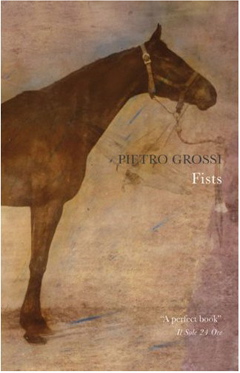.
.
Because the three works in this collection (“Fists,” “Horses,” and “The Monkey”) occupy 52, 45 and 41 pages respectively, some critics want to consign them to the category of the novella. I reject that label. It is too easily misunderstood as a warning to the reader to expect an awkward or forbidding reading experience — that the writing will lacking the quick digestibility of the short story and the embracing sweep of the novel. Instead, I think the pieces Pietro Grossi has written are best considered simply to be “stories.”
All three of these tales boast an uncommon degree of “readability.” Grossi’s unadorned prose drives forward a trio of plots that, while wildly different, share the common theme of young men discovering themselves at crossroads in their lives. Most notably in the title story, the reader is carried into an engrossing story you will long remember.
The first story, “Fists,” is the only one told in the first person, and the winning personality of the unnamed, adolescent narrator grabs you from the start. Though he is at heart “studious, nerdy, conventional, obedient,” echoes of Holden Caulfield can be heard in his rebellious talk (“I hated the piano. I hated Mozart and Bach and that deaf freak Beethoven”) and his simultaneous, sentimental acquiescence (“I don’t know, maybe if you convince yourself of something, in the end you get it”). His major act of rebellion that sets the plot in motion is demanding his mother permit him to take boxing lessons. She reluctantly agrees. Soon enough, as a amateur junior welterweight, he excels in sparring, acquires the nickname “Dancer,” and is lavished with praise (“so accurate and fast and technical”). But he remains ambivalent about fighting a regulation bout — until, that is, he watches the work of someone with an opposite style (“all hunched and as closed up as a ball of granite”).
Midpoint in the narrative, training begins for the 7-round fight between the Dancer and the Goat, and even if you’ve had your fill of “Rocky” movies I defy you not to be swept up in the momentum. Boxing stories of course can sink under the weight of metaphorical and symbolic meaning — life, fate, destiny and all the rest. Yet Grossi masterfully avoids cliché and nimbly negotiates through the formula. The author keeps the reader’s focus on the uneasy transition from child to man. As the young narrator explains: “Suddenly reality had put itself back together in front of my eyes just as it was, at its own speed, and that terrified me.”
The second story, “Horses,” is set in an unspecified territory and traces the path to maturity of two adolescent brothers whose father has given each of them a horse. Here the code of masculinity takes its cues from the American West. Elements in the story reminded me, favorably, of John Steinbeck’s “The Red Pony” and Denis Johnson’s Train Dreams.” Some readers may say Grossi tries to stuff too many ideas into this framework, but I myself was entranced from start to finish.
The final story, “The Monkey,” again switches setting, style and tone. In contemporary Rome, a thirty-something but still adolescent screenwriter is asked to come to the aid of childhood friend. As in many a sex comedy (especially those of the late 1950s and early 1960s), Nico is a man lost among women, frazzled by his needy girlfriend, his wacky mother, his abusive female agent, and his too-understanding ex-wife. Grossi orchestrates the proceedings with droll wit and laugh-out-loud vignettes (he’s a master of the satiric telephone conversation).
If there is a lesson common to all three parts of this splendid book, it is found in the observation of one of the brothers in “Horses”:
“Life was always like that, Daniel thought: something was always missing, whereas the nice thing about stories was that everything that should be there was there.”
.
Tags: Fists, Horses, Pietro Grossi, The Monkey
